Italy trip: Catania
21 photo with description10.05.2014 17:25
10.05.2014 17:25
Andrey Panevin

Before visit volcano Etna but since it is on other party Sicily we have decided to stay the night in Catania has been planned . At the same time have visited Syracuse.
So, fluently on sights Catania, photos and the text, we will begin from the central square.
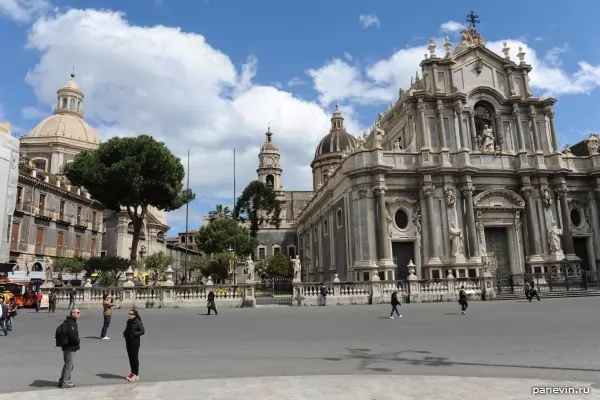
Cathedral of Catania on the Cathedral Square (Piazza Duomo).
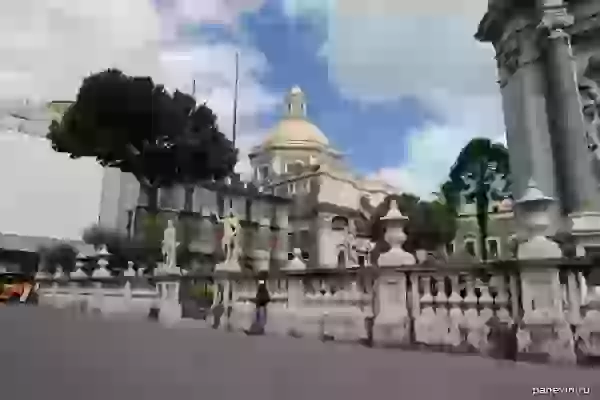
The square spacious, whence it is possible to think, that it was generated a century in XIX. Surrounding building is the assumption confirms.
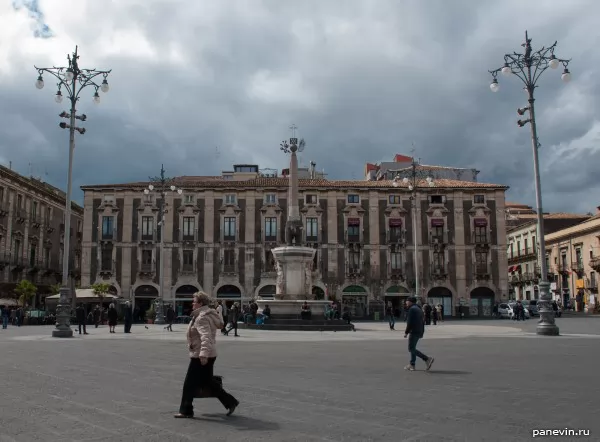
City symbol — an elephant and in the centre of the square the Fountain of Elephants. On a background a little remarkable building in the architectural plan — hotel (Hotel Centrale Europa).
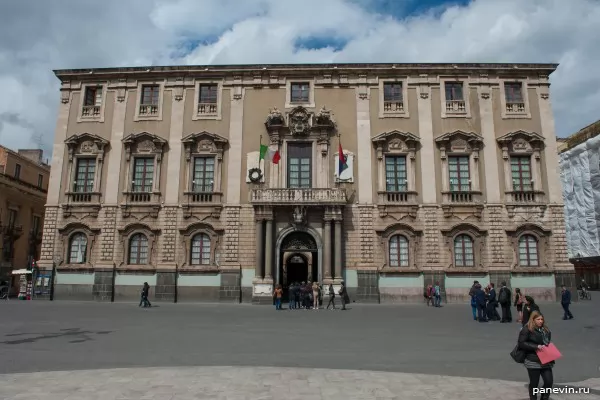
Palace of Elephants — ital. Palazzo degli Elefanti — municipality of Catania. Over windows there are figures of elephants, paternal the palace was called.
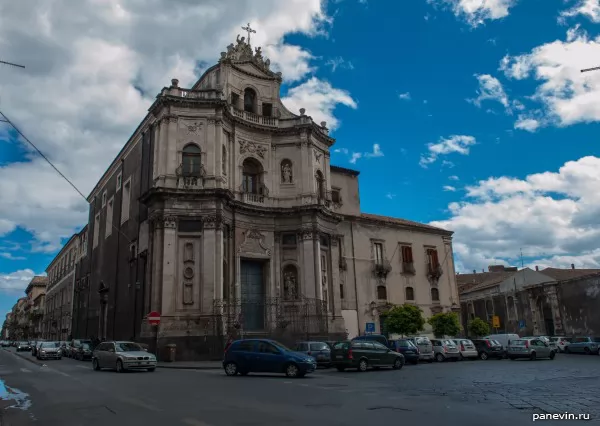
Church of San Placido, ital. Chiesa di San Placido in the street of Victor Emmanuel (ital. Via Vittorio Emanuele), classical classicism. Victor Emmanuel's street the second for popularity in the Sicilian cities, after street of Rome (Via Rome). Actually is for what — vigorously correcting and much at war Victor-Emmanuel II has collected the Italian cities in something more or less whole, becoming from the king of Piedmont and Sardinia and the first king of Italy.
But we have distracted.
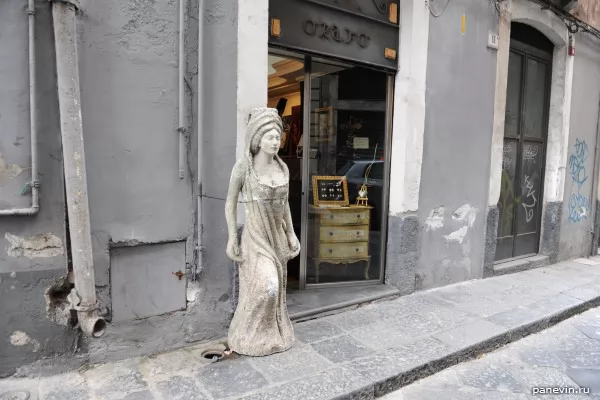
Antiquarian little shop. Before an enter there is statue (who — local sacred?).
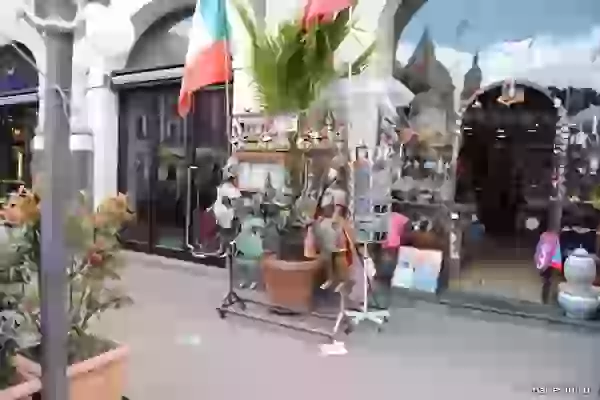
Typical souvenir shop.
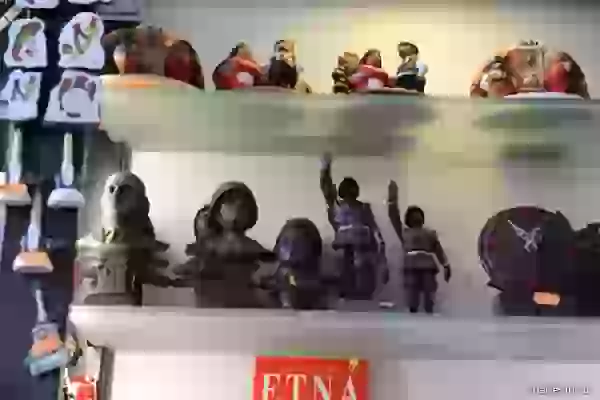
Having glanced inside I was stupefied — busts of Duche! Italians (sicilians in particular) treat kindly the favourite dictator. By the way figures from a volcanic lava, the blessing Etna nearby.
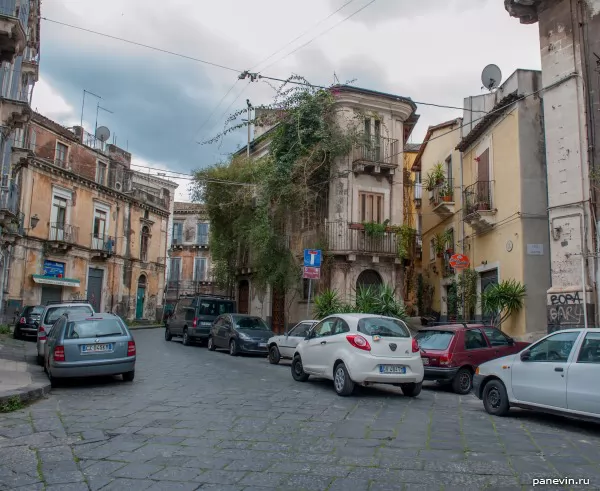
The surprising house serving to me by a reference point. Describing Trapani I has mentioned that Italians very much love greens. It grows everywhere, even where there is no earth (then beds are arranged).
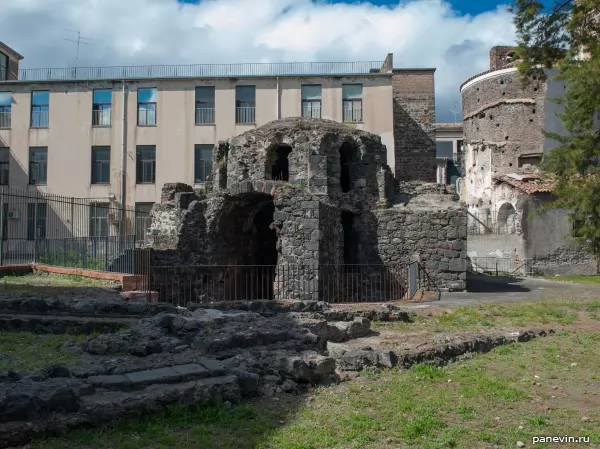
And here antique ruins have got to us — they are on all island. The rests of the Roman baths / term (ital. Terme romane dell'Indirizzo a Catania). I at first have accepted this structure for temple ruins, real appointment have found out already after returning home. Near to these terms it is located hostel in which we have stopped for the night and from a balcony the view not the small area with ruins a term opened:
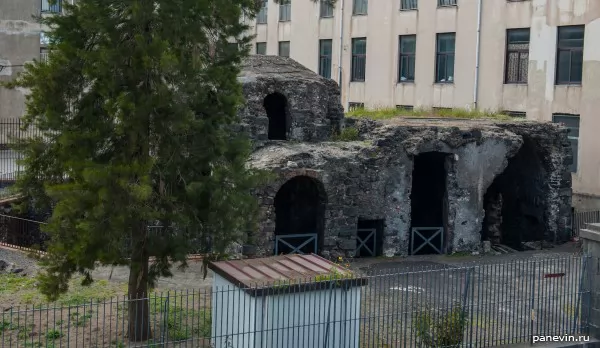
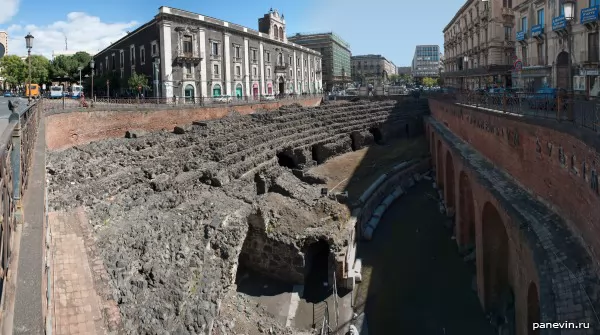
The Roman amphitheatre. Once, in youth, it was round. And the inscription on the right is much younger than ruins and says, neither it is a lot of nor a little: «Per me civitas Catanensium sublimatur a Christo» (something of type «Yes is famous Catania under the care of the Christ»). As though «Glory to Romans, the Christ crucified».
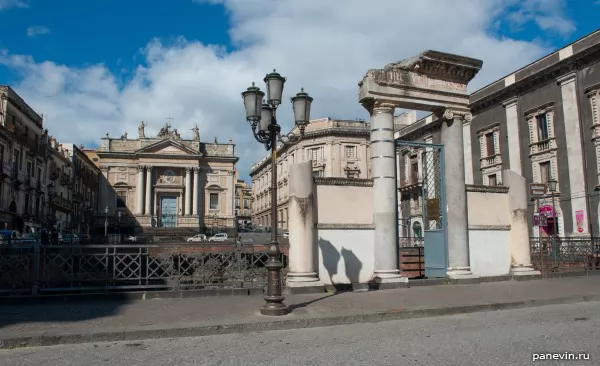
To an amphitheatre it is possible to go down, before an enter there are two columns Ionic Order. Columns the plate over them as I think, — stylisation under an antiquity can more or less historical. On a background — Church of St. Agate (Agatha) (Chiesa Sant Agata la Fornace o san Biagio).
There are still ruins Greek (subsequently become Roman) theatre and Odeon (as the Greek-Roman period — it is musical-concert hall, if on a modern harmony). To us they, unfortunately, have not turned up — we examined Catania, as well as other cities without fanaticism and the accurate plan.
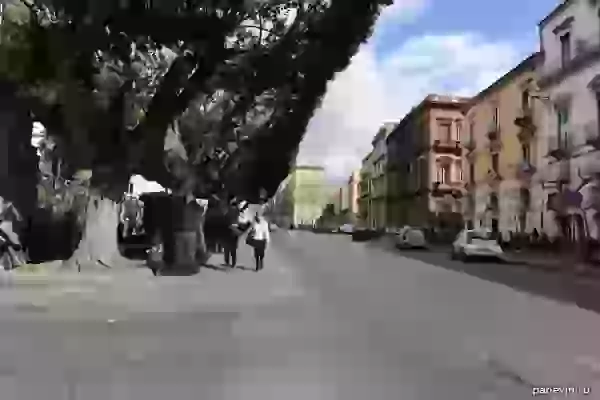
And on other party from an amphitheatre, on the same area — absolutely other calico! Houses from glass,shit and concrete.
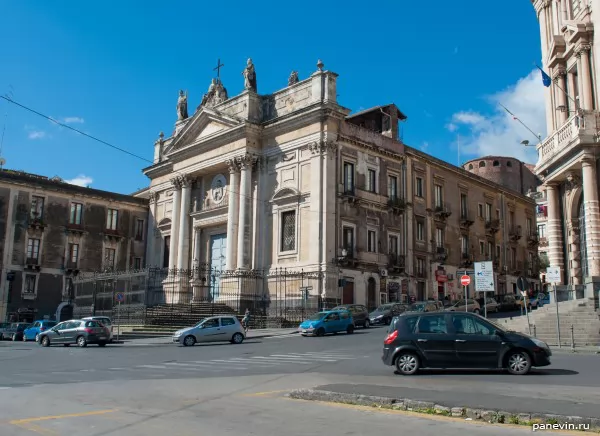
Chiesa Sant Agata (Agatha) la Fornace o san Biagio, it is short name — Chiesa di San Biagio, church in style of early classicism on piazza Stesicoro.
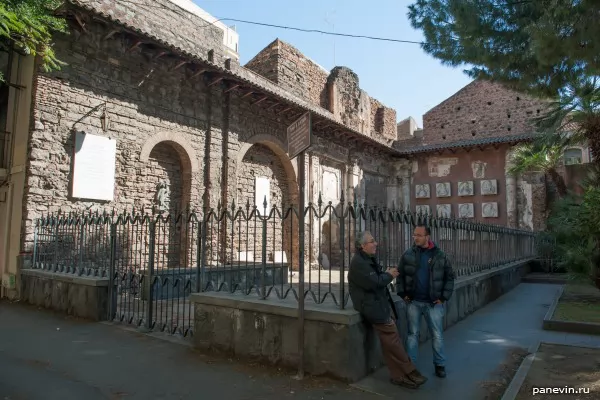
Ital. Tempio di Sant Euplio, church in the street has current name (Via Sant Euplio). The parishioner saint, archdeacon, whom sawed off his head.
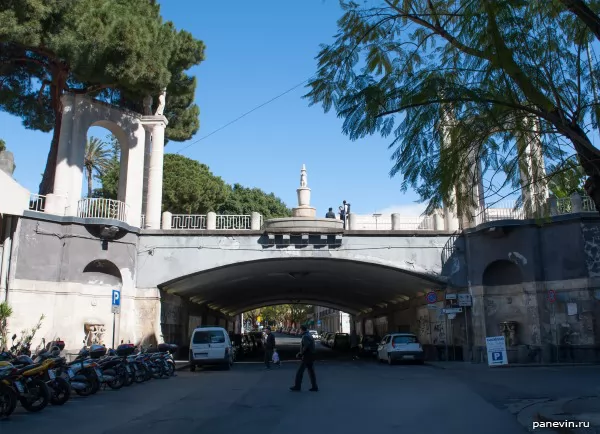
This foot bridge, most likely, modern (via Sant Euplio near to a crossroads with via della Posta). And a picture very indicative — two rams steal a march (sicilians run through road as well as Russians — anywhere where it wanted) and on the right rams stand under the badge of, despite the menacing tablet that the wrecker works.
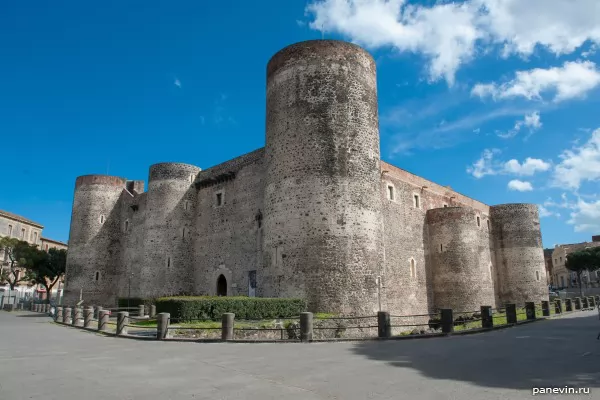
Catania — isn't small town, one of the largest on island, and without a fortress well no way is impossible — neighbours will not understand (besides in those days Saracens everyones, osmanli Turks). Castle Ursino (ital. Castello Ursino) — a fortress of XIII century in city centre.
Small streets of Catania:
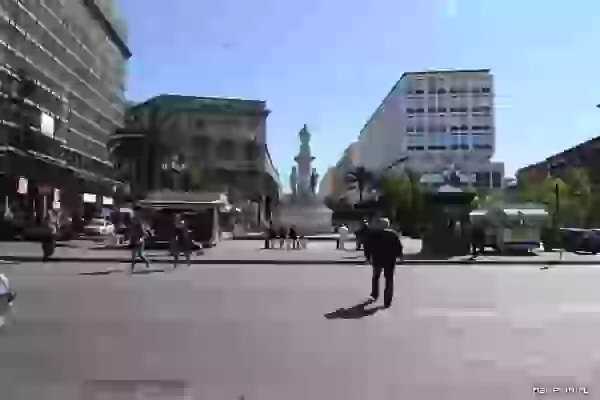
At last, the collection pearl, the most valuable photo not only from Catania, but also with all Sicily!
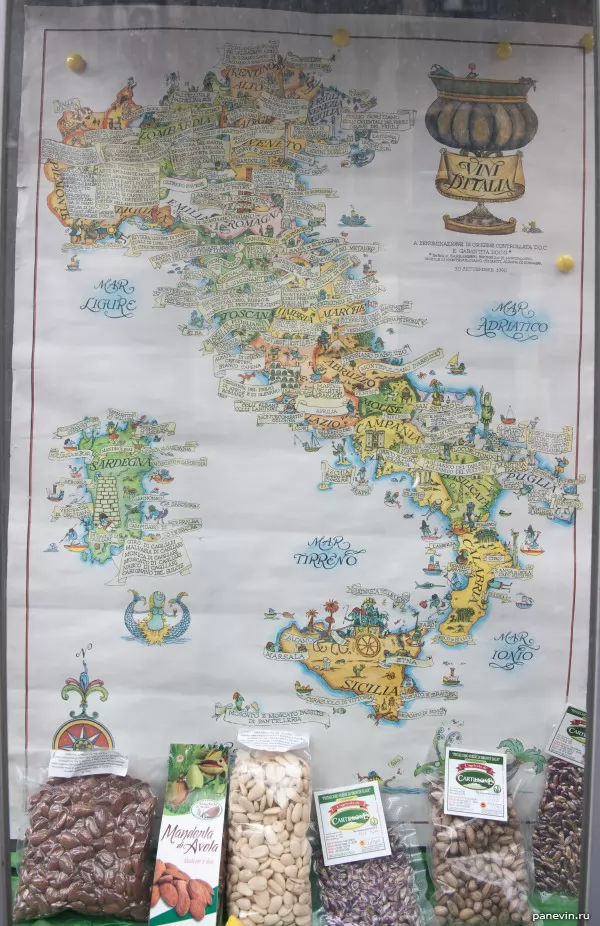
Wine map of Italy. Provinces, fault and grapes grades — the guidebook on Italy for the professional alcoholic (!). And a little shop in which window this card hung, — the price of wines from 10 euros. Not our variant.
This map in the maximum resolution.
So, fluently on sights Catania, photos and the text, we will begin from the central square.

Cathedral of Catania on the Cathedral Square (Piazza Duomo).
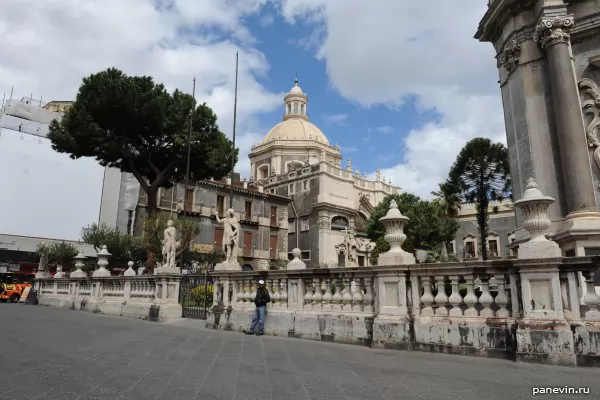
The square spacious, whence it is possible to think, that it was generated a century in XIX. Surrounding building is the assumption confirms.

City symbol — an elephant and in the centre of the square the Fountain of Elephants. On a background a little remarkable building in the architectural plan — hotel (Hotel Centrale Europa).

Palace of Elephants — ital. Palazzo degli Elefanti — municipality of Catania. Over windows there are figures of elephants, paternal the palace was called.

Church of San Placido, ital. Chiesa di San Placido in the street of Victor Emmanuel (ital. Via Vittorio Emanuele), classical classicism. Victor Emmanuel's street the second for popularity in the Sicilian cities, after street of Rome (Via Rome). Actually is for what — vigorously correcting and much at war Victor-Emmanuel II has collected the Italian cities in something more or less whole, becoming from the king of Piedmont and Sardinia and the first king of Italy.
But we have distracted.

Antiquarian little shop. Before an enter there is statue (who — local sacred?).
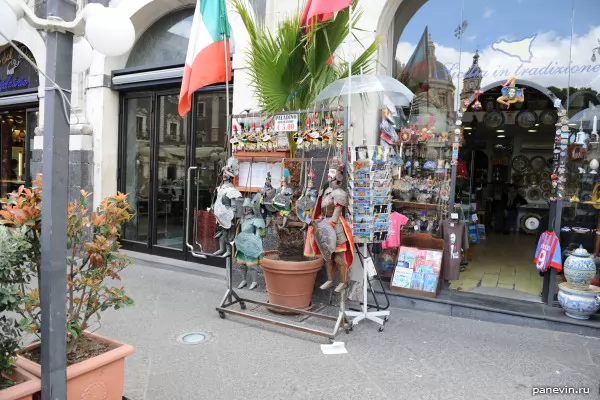
Typical souvenir shop.
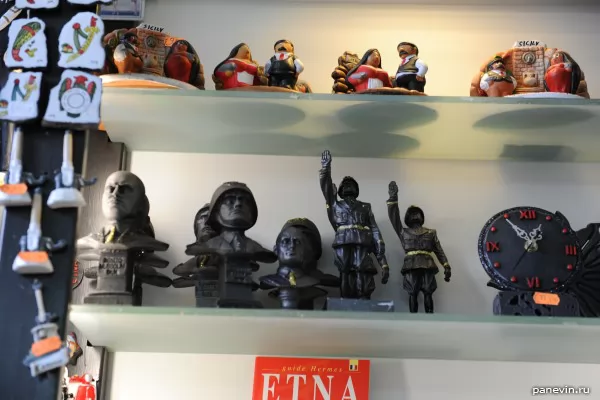
Having glanced inside I was stupefied — busts of Duche! Italians (sicilians in particular) treat kindly the favourite dictator. By the way figures from a volcanic lava, the blessing Etna nearby.

The surprising house serving to me by a reference point. Describing Trapani I has mentioned that Italians very much love greens. It grows everywhere, even where there is no earth (then beds are arranged).

And here antique ruins have got to us — they are on all island. The rests of the Roman baths / term (ital. Terme romane dell'Indirizzo a Catania). I at first have accepted this structure for temple ruins, real appointment have found out already after returning home. Near to these terms it is located hostel in which we have stopped for the night and from a balcony the view not the small area with ruins a term opened:


The Roman amphitheatre. Once, in youth, it was round. And the inscription on the right is much younger than ruins and says, neither it is a lot of nor a little: «Per me civitas Catanensium sublimatur a Christo» (something of type «Yes is famous Catania under the care of the Christ»). As though «Glory to Romans, the Christ crucified».

To an amphitheatre it is possible to go down, before an enter there are two columns Ionic Order. Columns the plate over them as I think, — stylisation under an antiquity can more or less historical. On a background — Church of St. Agate (Agatha) (Chiesa Sant Agata la Fornace o san Biagio).
There are still ruins Greek (subsequently become Roman) theatre and Odeon (as the Greek-Roman period — it is musical-concert hall, if on a modern harmony). To us they, unfortunately, have not turned up — we examined Catania, as well as other cities without fanaticism and the accurate plan.
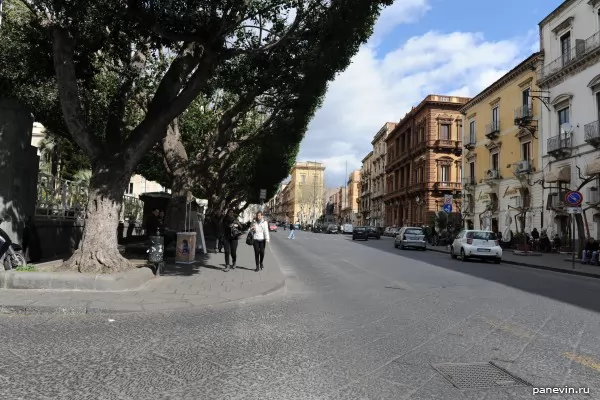
And on other party from an amphitheatre, on the same area — absolutely other calico! Houses from glass,

Chiesa Sant Agata (Agatha) la Fornace o san Biagio, it is short name — Chiesa di San Biagio, church in style of early classicism on piazza Stesicoro.

Ital. Tempio di Sant Euplio, church in the street has current name (Via Sant Euplio). The parishioner saint, archdeacon, whom sawed off his head.

This foot bridge, most likely, modern (via Sant Euplio near to a crossroads with via della Posta). And a picture very indicative — two rams steal a march (sicilians run through road as well as Russians — anywhere where it wanted) and on the right rams stand under the badge of, despite the menacing tablet that the wrecker works.

Catania — isn't small town, one of the largest on island, and without a fortress well no way is impossible — neighbours will not understand (besides in those days Saracens everyones, osmanli Turks). Castle Ursino (ital. Castello Ursino) — a fortress of XIII century in city centre.
Small streets of Catania:
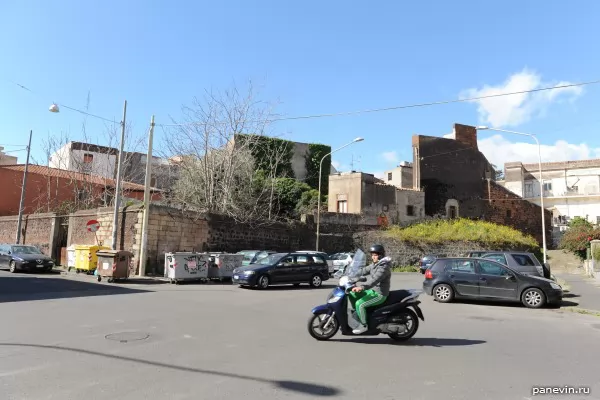
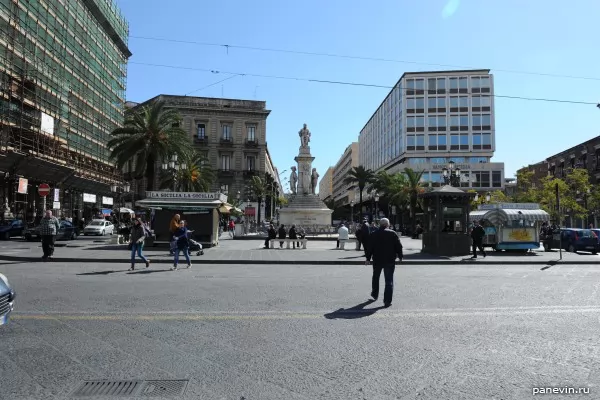
At last, the collection pearl, the most valuable photo not only from Catania, but also with all Sicily!

Wine map of Italy. Provinces, fault and grapes grades — the guidebook on Italy for the professional alcoholic (!). And a little shop in which window this card hung, — the price of wines from 10 euros. Not our variant.
This map in the maximum resolution.
Share:
Themes: Catania 1 Europe 25 Italy 12 photos 417 Sicily 12 travel 286
Ticket sales through JetRadar.com service without commissions and markups.
← Blog
poezdka_po_italii_kataniya
blog





